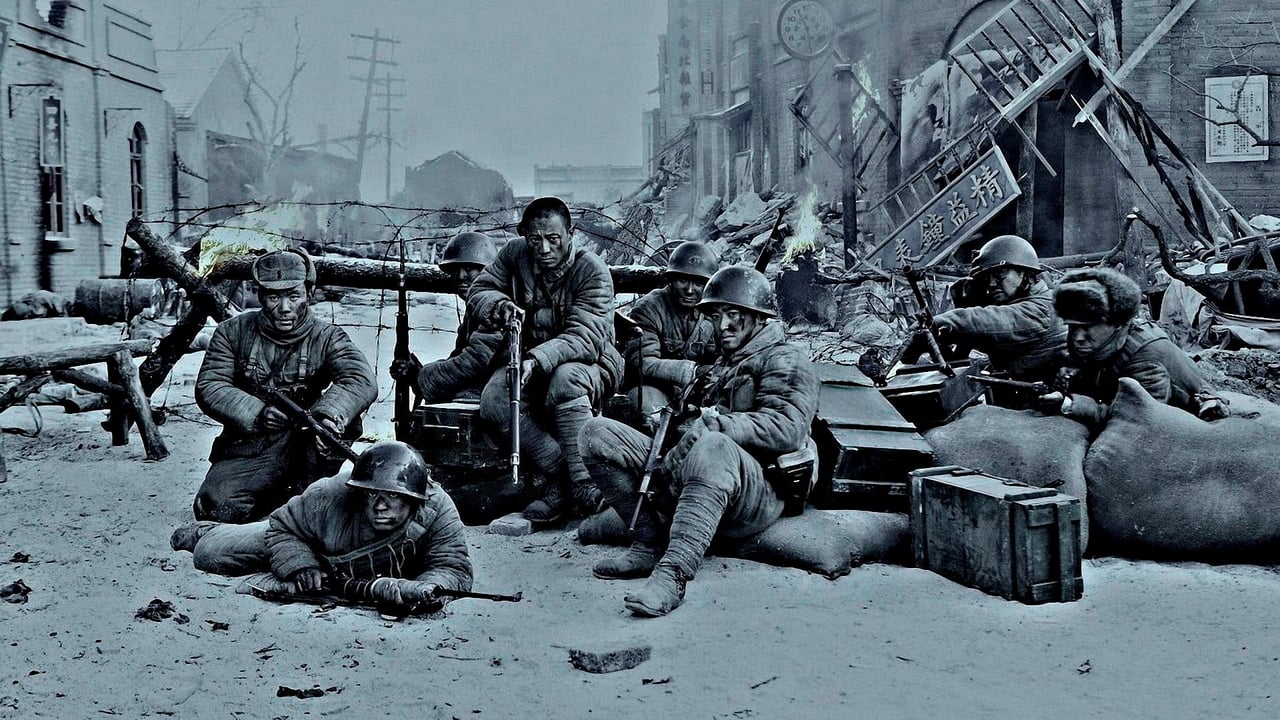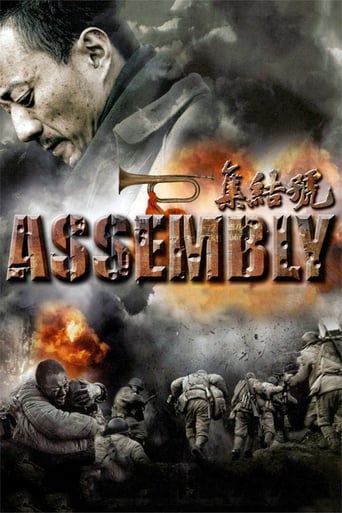Dynamixor
The performances transcend the film's tropes, grounding it in characters that feel more complete than this subgenre often produces.
Sameer Callahan
It really made me laugh, but for some moments I was tearing up because I could relate so much.
Aneesa Wardle
The story, direction, characters, and writing/dialogue is akin to taking a tranquilizer shot to the neck, but everything else was so well done.
Lidia Draper
Great example of an old-fashioned, pure-at-heart escapist event movie that doesn't pretend to be anything that it's not and has boat loads of fun being its own ludicrous self.
bghilliotti
Some of the best cinemagraphic depiction of combat that I have seen. The movie was in Chinese, making it more realistic; however, the English subtitles were presented very quickly and it was hard to follow the story. The intense action of the film tended to distract you from effectively reading the subtitles. Brian Ghilliotti
Hunky Stud
I have heard a lot of good things about this movie, so I decided to watch it.Well, it wasn't as good as I expected at all. Essentially, it is just another Chinese communist propaganda. No matter how big the mistake the Party made, in the end, the Chinese communist party always does the right thing for its people. That is basically what every mainland Chinese movie is all about. This is just another updated version with better picture quality and better sound effects.For mainland Chinese people, they got brainwashed by the Chinese communist party. Of course, they love this movie. It makes them feel so touched and "proud". There is nothing to be proud of, because the Chinese communist soldiers were killing the Chinese nationalist soldiers who were also Chinese. At that time, the Chinese communist soldiers would be labeled at anti-government terrorists according to today's standard. If the Chinese communist party didn't win the civil war, China might be a better country than it is today. And look at today's China, so many common people have so many things that they want to complain to the communist party, but some of them were even sent to the psychiatric hospitals.The first hour was way too long. It was a simple story, there is no need to show the audience one event for an entire hour. Some of the scenes remind of me "Saving private Ryan." Remember people, only good things about the Chinese communist party are allowed to be made movies. The bad things are not even allowed to be published anywhere inside of mainland China. Those oversea web sites are also blocked inside of mainland China. That is the reality.
Robert_Woodward
Assembly is a gripping film about the Chinese civil war and its aftermath, recounted through the story of a doomed company of Communist soldiers and the subsequent struggle of their commander, Gu Zidi, to win recognition for their sacrifice. Hanyu Zhang is superb in the role of Gu Zidi, carrying the memory of his lost and forgotten comrades, and is the focus for a film that is by turns brutal, moving and provocative.The opening battle scene is Assembly is startlingly violent and throughout the film the portrayal of modern weaponry and its effect upon human bodies is truly frightening. The battles are impressively staged and meticulously detailed, from the soldiers' uniforms to the networks of defensive trenches. There are some eye-opening details about the nature of warfare in the Chinese civil war, including the deployment of 'political officers' to encourage Communist troops to act in line with Party doctrine.Admittedly, much of the film's appeal stems from its foreign origins. The Chinese civil war and the subsequent war in Korea are not often portrayed in the cinema, and it is even more rare to get a Chinese perspective on these events. Certainly this makes it difficult to find a point of reference by which to assess the success of Assembly. Nevertheless, I did have some reservations, including the camera-work. The battle scenes cut frantically between different shots, unlike, for instance, the opening scenes in Saving Private Ryan, where the action relentlessly tracks the soldiers' landing on the D-Day beach. This repeated cutting and changing conveys some sense of the chaos of warfare, but I feel that the shaky camera-work was overplayed and found this a bit irksome after the first few battle scenes.A more general problem is that this film focuses almost exclusively on the actions of the Communist soldiers. It would have been interesting to learn more about the Nationalist Guomindang soldiers, but they are barely afforded any speaking roles. Although Assembly is written from the perspective of the winning side, it does not begin to examine why the Communists were at one time so short of munitions and especially men in fighting the war against the Nationalists. The story of Gu Zidi's company of men is a battle against the odds, but the film does not delve into the root causes of their desperation.But although Assembly is a portrait of one side in a long military conflict there is surprising depth to this portrait. The film does not follow a straightforward triumphalist narrative about Communist war heroes, but instead builds a complex tale of an individual (Gu Zidi) who struggles for the posthumous recognition of individual soldiers who made an individual sacrifice. These were soldiers who were scared and sometimes balked at the dangers before them – as would anyone – but they made the ultimate sacrifice and Gu Zidi strives to have their efforts recognised as a unique contribution to the war effort. That it is such a great struggle for Gu Zidi to secure a memorial for these fallen comrades is at least partly an indictment of post-war society and government in China.Assembly achieves a remarkable amount in less than two hours. It is a vivid reconstruction of struggles during and after the war and is moreover a deeply moving experience, especially in its final frames. And if part of the appeal lies in the fact that this is a foreign film about a little-known war, then that is all the more reason to seek it out.
Master_of_My_Domain
"Saving Private Ryan" it is NOT, but certainly it is as equally worth viewing for any fans of military/warfare film. And for any "westerners" unaccustomed with China's history, it may give some insight to tiny part of her modern part some 50+ years ago events that led to fall of Chang Kai Shek and rise of communism under Mao Zhe Dong's.The story line is compelling, similarly to "SPR" we have some well drawn all-human characters and their war story laced with brutal, bloody and yet so mesmerizing scenes, an insight to mankind at its worst.The acting is excellent, even the supporting actors and extras performed all great or at least sufficiently enough to make us believe the scenes we are watching could have happened exactly as they are portrayed on the screen.Why then I gave it 9 instead of 10? Well. Firstly. The film, although officially not the production of "1st of August Film Studio" (official Chinese communist party's propaganda flicks maker), it still suffers a bit from their propagandist influence. The red comrades are nicer than their nationalist foes and - according to this film's tones and "between the lines" messages - they fought for their country (implying that the Chang Kai Shek's nationalists were traitors). Like the hundreds of millions Chinese murdered later by the China's Communist Party during the years that followed have never happened, hmm. But, of course, for the characters shown in the film, it is their future. They don't know it yet - OK, I can believe that. But why PLA's foes (the Nationalists) are basically the shadows in this film? For a "humane warfare film" (as this film is pretending to be about) it is very unhuman depiction of 'the other side' - and I didn't hear anything about Mr. Xiaogang Feng plans to make a sequel about them... (like Clint Eastwood did with "Flags of Our Fathers" and "Letters from Iwo Jima") Second. While the fighting scenes and visual FX are great, the sets weren't prepared as equally. And I really mean it. The hand-held camera actions, the gory, the over-all realism of the brutal warfare scenes are almost as great as the ones in "SPR". But unfortunately the set decorators more often than not were skimping on the realism of the set. So-obvious spray-painting black patches on the walls (to masquerade them as burnt-out or post-explosion marks) is so evident failure of completing the film's realism to me (and I'm not even mentioning those PLA soldiers wearing US helmets - after all it *may* have happened somehow). Yes, I understand that most of the film-viewers wouldn't even notice it, but since so much energy, so much attention to other details was paid during the production of this film, why oh why they couldn't close it complete in every detail?

